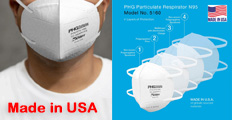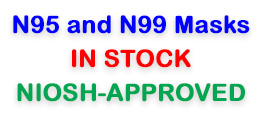



Find all of your laboratory and workplace safety supplies at Safety Emporium!
 NAICS |
 Glossary Index |
 Nausea |
| MSDS Topics |
Free Sites | FAQ's | Regulations | Glossary | Software | Suppliers |
| Books | Forum | Poll | Fun stuff | Quiz | Store | |
| Understand your MSDS with the MS-Demystifier | Search ALL our MSDS info | |||||
Narcosis is a state of deep stupor or unconsciousness produced by a chemical substance such as a drug or anesthesia.
A narcotic is a substance that induces narcosis.

Get your Break glass keyboxes and other emergency accessories from Safety Emporium.
Inhalation of certain chemicals can lead to narcosis. For example, diethyl ether and chloroform, two common organic solvents, were among the first examples of anesthesia known.
Deliberate inhalation of chemicals such as spray paints and household aerosols to obtain a quick "buzz" or high, a practice called huffing, is an disturbingly common activity among adolescents and young adults. This practice is exceedingly dangerous and likely to lead to brain damage or death. See the inhalants links under Further Reading for more information.
Many other chemicals that you would not suspect can also cause narcosis. For example, even though nitrogen gas comprises 78% of the air we breathe and is considered chemically inert (unreactive) it can cause narcosis under certain conditions.
This term usually appears on an Safety Data Sheet as a possible symptom of exposure, usually through inhalation. This would be listed in Section 11 (toxicological information) of the SDS.
Always work with adequate ventilation and avoid inhaling chemical fumes, mists, dusts etc. whenever possible. Use fume hoods and respirators as necessary. Section 8 (exposure controls/personal protection) of the SDS should suggest appropriate protective measures.

Keep your reactions together with these Keck-style standard taper joint clips from Safety Emporium.
See also: anesthesia, coma, ventilation.
Additional definitions from Google and OneLook.
Entry last updated: Friday, January 6, 2023. This page is copyright 2000-2025 by ILPI. Unauthorized duplication or posting on other web sites is expressly prohibited. Send suggestions, comments, and new entry desires (include the URL if applicable) to us by email.
Disclaimer: The information contained herein is believed to be true and accurate, however ILPI makes no guarantees concerning the veracity of any statement. Use of any information on this page is at the reader's own risk. ILPI strongly encourages the reader to consult the appropriate local, state and federal agencies concerning the matters discussed herein.